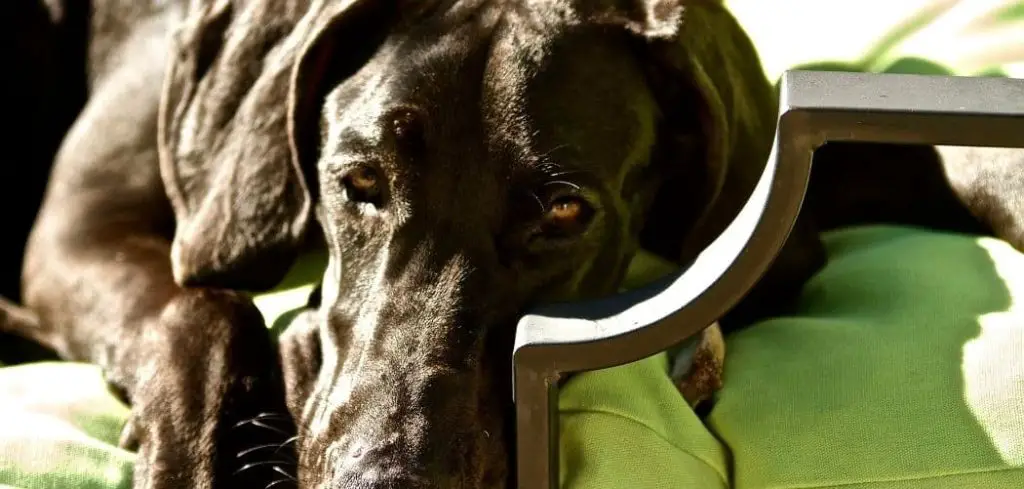It can be distressing to see your senior dog panting heavily and pacing restlessly during the night. These behaviors may indicate discomfort, pain, or an underlying medical issue that requires attention.
We outline the common reasons why your old dog is panting and restless at night, what you can do at home, and when to seek veterinary help.
Old Dog Panting and Restless at Night — Why It Happens
Older dogs may pant and act restless at night due to a combination of physical and emotional factors. Pain from arthritis, cognitive decline, anxiety, heart disease, or respiratory problems can disrupt nighttime rest.
Hormonal imbalances or side effects from medications may also contribute to this behavior. Sometimes, environmental factors like heat or noise can make symptoms worse.

Reasons Why Your Old Dog Is Panting and Restless at Night
Arthritis and Joint Pain
As dogs age, arthritis and degenerative joint disease become more common. Pain and stiffness often worsen at night when your dog is lying down, making them shift position frequently and pant from discomfort.
You may notice your dog having trouble getting up in the morning, limping, or showing reluctance to climb stairs.
Panting can be a way of coping with pain, while pacing may help relieve stiffness.
Read more: Dog Panting Excessively and Restless (Here’s why)
Canine Cognitive Dysfunction (Dog Dementia)
Older dogs can develop cognitive decline similar to Alzheimer’s in humans. Confusion and disorientation often worsen at night, a phenomenon known as “sundowning.”
Your dog may wander, pant, bark, or seem anxious without an obvious trigger. This condition is progressive but can sometimes be managed with medication and environmental adjustments.
Anxiety and Restlessness
Senior dogs may develop new anxieties or have heightened responses to stress. Nighttime separation, changes in routine, or fear of noises can lead to pacing and panting.
Unlike younger dogs, older pets may not easily settle back down, and anxiety can quickly escalate. Over time, this can affect their sleep quality and overall health.
Heart Disease
Heart problems are more common in senior dogs and can cause nighttime panting due to difficulty breathing or reduced oxygen circulation. Lying down can worsen these symptoms, prompting restlessness.
Other signs may include coughing, reduced stamina, or swelling in the abdomen or legs. This is a potentially serious condition requiring veterinary attention.
Respiratory Disease
Chronic respiratory issues like tracheal collapse, bronchitis, or lung disease can cause breathing difficulty, especially when your dog is lying flat.
Panting may be your dog’s way of trying to get more oxygen, while pacing could be an attempt to find a position that eases breathing.
Hormonal Disorders
Conditions like Cushing’s disease can cause excessive panting, especially at night. Hormonal imbalances may also cause increased thirst, hunger, and restlessness.
These conditions often develop gradually, so subtle signs like panting at unusual times should not be overlooked.
What to Do If Your Old Dog Is Panting and Restless at Night
Make sure your dog’s sleeping area is quiet, comfortable, and kept at a cool temperature. Provide supportive bedding to help ease joint pain and encourage relaxation.
If anxiety is suspected, try playing calming music, using white noise, or offering a night light. Maintaining a consistent evening routine can also help reassure your dog.
For arthritis or chronic pain, speak to your vet about pain relief or joint supplements. Gentle evening walks may help loosen stiff joints before bedtime.
If symptoms persist, keep a diary of nighttime behaviors and share it with your vet to help identify patterns or triggers.
When to Call or Visit Your Vet
Seek veterinary attention immediately if your dog’s panting is accompanied by labored breathing, collapse, blue-tinged gums, or severe lethargy.
Persistent coughing, swelling, or signs of pain also warrant a prompt check-up.
If your dog’s restlessness is worsening or interfering with their quality of life, a vet can help identify the underlying cause and provide treatment.
Read more: Why Is My Dog Suddenly Panting and Restless? (Here’s why)
Key Takeaway
Panting and restlessness at night in an older dog can be signs of pain, anxiety, or underlying illness. While some causes are manageable at home, others require veterinary care.
By observing your dog closely, making their environment comfortable, and seeking timely medical advice, you can help ensure your senior dog rests more peacefully at night.
